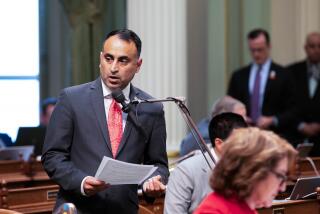Health Insurers Urge Uniform Rate Structure
- Share via
WASHINGTON — In a departure from its pre-election stance, the officers of the nation’s largest commercial health insurance coalition Wednesday recommended that members adopt a health care reform plan that would require hospitals and doctors to charge all their patients virtually the same rates for the same service.
Currently hospitals and doctors are paid different rates for the same services by different insurance companies. Medicare and Medicaid often pay less than the actual cost of the service, and hospitals recoup the loss by charging other patients more.
Directors of the Health Insurance Assn. of America said they would ask the government to assure that all insurers, including government agencies, pay about the same rates.
The insurance association board Wednesday night also endorsed proposals, to be sent to its members this week, that would require all individuals to obtain health insurance either through their employer or individually. Employers would have to offer insurance to workers but would not be required to pay for it. The expectation is that many workers would be willing to pay for their own insurance at lower group rates.
The insurance association board also recommended that the government tax health insurance premiums that exceed the cost of a standard benefit plan. At present, when a worker receives health insurance through an employer, no portion of the value of the premium is counted as taxable income to the worker. The change is designed to make workers more aware of the value of the insurance they obtain and discourage them from seeking marginal or excessive care. President-elect Bill Clinton wants a government board to define a standard benefit plan that all insurers would have to offer.
“This is major, this is radical,” said a top HIAA official who asked not to be named. The group has never before endorsed uniform rates, any mandate making coverage or policies available, or taxing workers on the value of employer-paid premiums.
The significance of the vote by the HIAA board, whose previous proposal was closer to the incremental market revisions advocated by President Bush, is that it tentatively moves the organization closer to Clinton’s general outline for health care reform. The insurance industry traditionally has been opposed to a broad overhaul of the health care system.
The HIAA represents 290 commercial insurance companies, which together account for 40% of the private health insurance business. The issue of health care reform and which proposals the association should back has caused a major shake-up of the group. Four of its largest members, whose business should be helped by the Clinton plan, recently dropped out of the group.
To make sure everyone has insurance, the board recommended that the government pay for health insurance for individuals with incomes below the poverty line and that it subsidize insurance for other low-income Americans if they lack insurance on the job.
More to Read
Sign up for Essential California
The most important California stories and recommendations in your inbox every morning.
You may occasionally receive promotional content from the Los Angeles Times.













